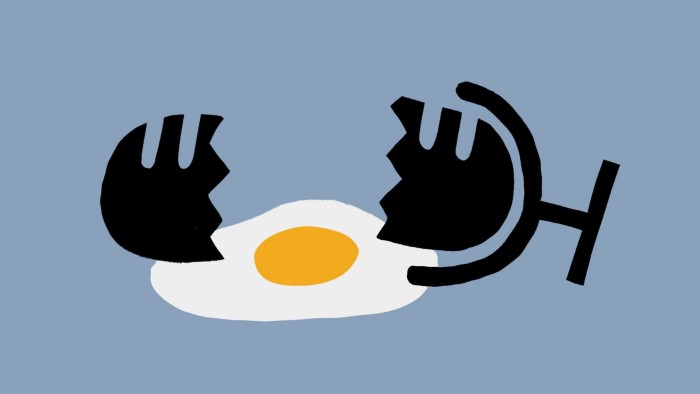On October 15, two British megastars took to the stage at London’s O2, their last night in a sellout arena tour of the country. As many as 15,000 adoring fans surrounded a podium that had been set up “in the round” like a boxing ring, cheering and applauding and shouting out “I love you!” Some wore official merch: T-shirts with their idols’ faces on them.
Not all heroes have a podcast, but many do nowadays. The two men on stage were none other than Tony Blair’s former spin-doctor Alastair Campbell, and former MP and Tory leadership candidate Rory Stewart, now co-hosts of the preposterously popular The Rest is Politics, beloved by fellow centrist dads up and down Great Britain (and increasingly other demographics, too).
It was the first time the O2 had hosted a live politics podcast, though not the first time the pair had taken to the stage. They had to start booking arenas after selling out the Royal Albert Hall — a venue that this month hosted a live version of the only marginally less popular podcast The News Agents. Last year, Stewart described the amount he earns from podcasting as “championship footballer money”. Estimates that he and Campbell each make over £100,000 a month seem reasonable — and that’s before taking into account live show ticket sales (a middle-tier seat at the O2 costs around £100).
What’s going on? What would motivate someone to travel to a ghastly and overcrowded shopping-centre-cum-events-venue and spend good money to watch two middle-aged men engage in a surely somewhat predictable — for the listeners of their twice-weekly episodes — discussion from several hundred feet away? And what does the huge success of independent, politically moderate podcasts, on both sides of the Atlantic, tell us about what people want from politics and the media?
First, it proves that in a massively oversaturated info-pinion landscape, having a few well-informed people who can be relied upon to provide some fairly sensible opinions can help reduce the feeling of perpetual overwhelm.
Second, it once again demonstrates the fact that many people feel stuck in the middle of a polarised landscape — alienated by a “mainstream media” they feel pushes a liberal-left agenda too aggressively; repelled by the narratives being pushed on the right. There is evidently appetite for spaces in which reasonable people can disagree politely and constructively.
And third, people have tired of being presented with an artificial, scripted, carefully stage-managed version of reality. They just don’t buy it any more. Social media has made it much easier to, as the meme goes, “DYOR” (do your own research). Whether or not what you find is wrong or fake or lacking in context is, unfortunately, beside the point. Self-directed discovery can be more persuasive and compelling than a carefully edited TV news segment or newspaper article.
TikTok, meanwhile, is both a symptom and a cause of the growing desire for low-fi, unpolished, somewhat chaotic content (though, ironically, the algorithms feeding us this content are growing more sophisticated by the day).
This craving for authenticity — even if it has been carefully constructed — is manifesting itself in the way people are voting, too. It is part of the reason Nigel Farage is so popular (a recent poll by Ipsos gave the Reform UK leader the highest favourability ratings of any British politician). And it was a crucial factor in the rambling, freewheeling, “turn-that-music-up” Donald Trump beating the slick, celebrity-endorsed Kamala Harris in the US presidential election.
Yet this is still not well understood. “Nothing that was true yesterday about how flawlessly this campaign was run is not true now,” MSNBC host Joy-Ann Reid said of Harris during a televised discussion of the election results on November 6. “This really was a historic, flawlessly run campaign.” Reid also pointed out that Harris had “every prominent celebrity voice . . . the Swifties, she had the Bee Hive” — a reference to Taylor Swift and Beyoncé’s respective fan bases.
The failure to understand that endorsement from a slew of celebrities might not have worked in Harris’s favour was striking. But Reid was far from the only one to push the peculiar idea that the woman who lost the presidential election by almost 2.5mn votes ran a “flawless” campaign.
If her campaign had been flawless, she would have won. Funnily enough, that might have required doing something that charismatic politicians and podcast hosts alike understand instinctively: letting your guard down a little, and showing people that you are a flawed human being, just like them.
Read the full article here

